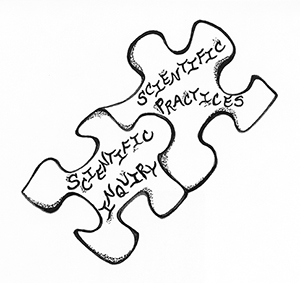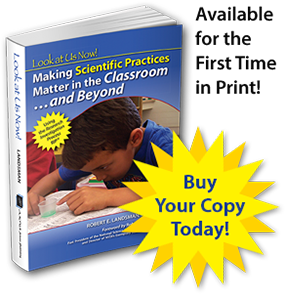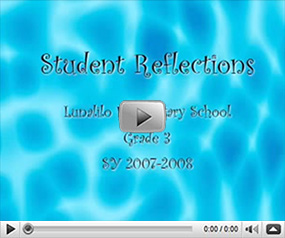More Emphasis on Next Generation Learners
Chapter 1. Supporting the Next Generation of Scientific Practices with More Emphasis on Learners and Their Thinking
by Robert E. Landsman, PHD and Irene H. Kamimura
 A scientist, Dr. Robert Landsman, and a standards-based resource teacher, Irene Kamimura, provide the theoretical framework for this book, discussing the book’s content as it pertains to scientific practices in the national science standards and the More Emphasis conditions, full and open inquiry, and STEM.
A scientist, Dr. Robert Landsman, and a standards-based resource teacher, Irene Kamimura, provide the theoretical framework for this book, discussing the book’s content as it pertains to scientific practices in the national science standards and the More Emphasis conditions, full and open inquiry, and STEM.
“Just as discovery about the natural world does not simply happen to the scientist, ‘learning science is something students do, not something that is done to them’ (National Research Council, 1996, p. 20). And just as the research process in which scientists engage to learn about the natural world successfully leads them down pathways to new knowledge about the world, active engagement in inquiries (doing and thinking practiced by scientists to learn about the natural world) based on student interests and relevance (both essential characteristics of a school’s standards-based science curriculum) results in the ‘best’ science learning (Bess, 1997; Brandt, 1998; National Research Council, 1996, 2000a). Research has demonstrated the benefits of such inquiry centered strategies of instruction, beginning in kindergarten and spanning economically advantaged and disadvantaged students (National Science Resource Center, 1997). This emphasis on ‘scientific practices’ in the learning of elementary through high school level science is well grounded in brain research related to learning and is prominent in A Framework for K-12 Science Education (National Research Council, 2000b, 2012). This emphasis is also present throughout the Next Generation Science Standards (NGSS; Achieve, Inc., 2013).”
This chapter introduces the book’s authors and their chapters in the context of the components of the Research Investigation Process (RIP®) model of scientific inquiry.
It also provides a general description of the RIP®, integrating aspects of the inquiries featured in the 10 teacher-authored chapters where appropriate (Chapters 2 through 11). These chapters describe the research investigations conducted by their students and the minor to major modifications made by these teachers (and, in many cases, their students) to attain the More Emphasis conditions (NRC, 1996) that supported successful scientific inquiry-based teaching and learning. Some of the modifications that the teachers describe include subtle changes such as allocating time for students to ask questions or reflect. Others include extensive adjustments to what was traditionally occurring in the classroom, such as involving outside partners or using the process of scientific inquiry as an intervention primarily targeting the learning of non-science standards-based content.
Your Shopping Cart
Ordering five (5) or more copies? Contact us for a special volume discount.
Read the Foreword
Enter your name and e-mail address below for immediate access to read the complete Foreword, written by Dr. Robert E. Yager, in its entirety.


 ANOVA Science
ANOVA Science